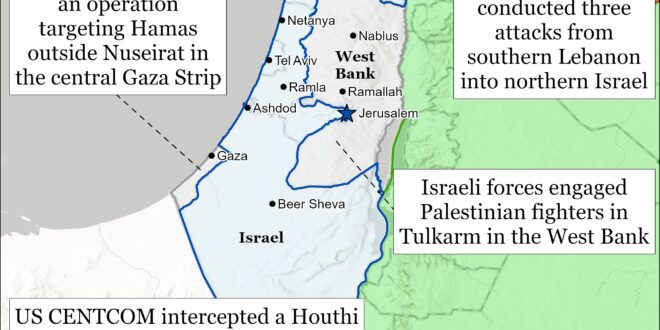Iran appears to be exploiting the uncertainty surrounding its reported “imminent” attack against Israel to stoke psychological terror in Israel. Western media reported on April 10 that Iran could launch drone and missile strikes into Israel imminently in retaliation for the IDF recently killing several senior IRGC officers in Damascus.[i] Iranian state media posted on X (Twitter) later on April 10 that the Iranian defense minister announced the closure of the airspace around Tehran for a military exercise.[ii] Iranian regime-affiliated channels then began circulating posts suggesting that an Iranian attack into Israel would soon occur.[iii] The coincidence of these posts led to extensive public speculation that Iran would launch an attack into Israel while the airspace around Tehran was closed. Iranian state media shortly thereafter retracted the claims of Iranian airspace being closed and denied that the Iranian defense minister made any related announcement.[iv] The publication and retraction of these reports is bizarre, especially given that the Iranian defense minister should have no role in the maintenance of Iranian airspace. Iranian military and political officials have boasted in recent days that the impending nature of their attack is itself damaging to Israel, suggesting that the media reports may have been part of a sophisticated information operation.[v] Stoking terror in Israel is consistent with CTP-ISW’s previous observation that Iranian leaders want the Israel-Hamas war to catalyze migration away from Israel and thereby erode the long-term viability of the Jewish state.[vi]
The present nature of the information space makes it difficult to forecast when precisely Iran might launch a retaliatory strike into Israel if at all. Western estimations of when Iran will conduct an attack have varied and could be subject to change. The likelihood that Iran is spreading disinformation surrounding its strike exacerbates the issue further.
Israeli Defense Minister Yoav Gallant clarified on April 10 that Israel’s war aim in the Gaza Strip is to prevent Hamas from conducting another October 7-style attack into Israel again.[vii] Gallant said that preventing another October 7-style attack is what Israeli leaders mean when saying that they seek to destroy Hamas as a military organization. Gallant added that the IDF has already destroyed four of Hamas’ five brigades and that Israeli forces are currently contending with “hotspots” of militia activity across the Gaza Strip.[viii] The remaining brigade that Israeli leaders say that they have not yet destroyed is in Rafah.
Israeli operations have likely degraded Hamas in the Gaza Strip severely, rendering Hamas unable to restore its military wing to pre-October 7 levels in the short term. Gallant described Hamas’ military force as comparable to an “organized commando division” prior to the war. Israel has since then destroyed a large quantity of Hamas’ military infrastructure and weapons as well as killed thousands of fighters in the Gaza Strip thus far. Hamas fighters are currently operating as small squad- and platoon-sized cells instead of the well-organized structure they had prior to the war. Hamas will thus require extensive resources and time to rebuild their military force.
Hamas remains determined to reconstitute itself militarily and reassert its authority in the Gaza Strip, however. Hamas is already trying to coopt and undermine possible alternatives to its rule, which is evident by the reported Hamas attack targeting a head of a local clan in March 2024.[ix] Hamas is also attempting to facilitate trade and rehabilitate local police in the northern Gaza Strip, which are parts of Hamas’ larger effort to restore control over the civilian population.[x] Gallant acknowledged that Israel must empower a local alternative to Hamas in a post-war scenario.[xi]
Key Takeaways:
- Iran: Iran appears to be exploiting the uncertainty surrounding its reported “imminent” attack against Israel to stoke psychological terror in Israel.
- Gaza Strip: Israeli Defense Minister Yoav Gallant clarified that Israel’s war aim in the Gaza Strip is to prevent Hamas from conducting another October 7-style attack into Israel again.
- West Bank: Israeli forces engaged Palestinian fighters in Tulkarm in the West Bank.
- Southern Lebanon and Golan Heights: Lebanese Hezbollah has conducted at least three attacks from southern Lebanon into northern Israel.
- Iraq: Iraqi Prime Minister Mohammad Shia al Sudani wrote an article for Foreign Affairs reiterating his intention to end the US-led international coalition’s presence in Iraq and transition to a “comprehensive” bilateral relationship with the United States.
- Yemen: US CENTCOM confirmed that it intercepted three Houthi drones over the Gulf of Aden and Red Sea.
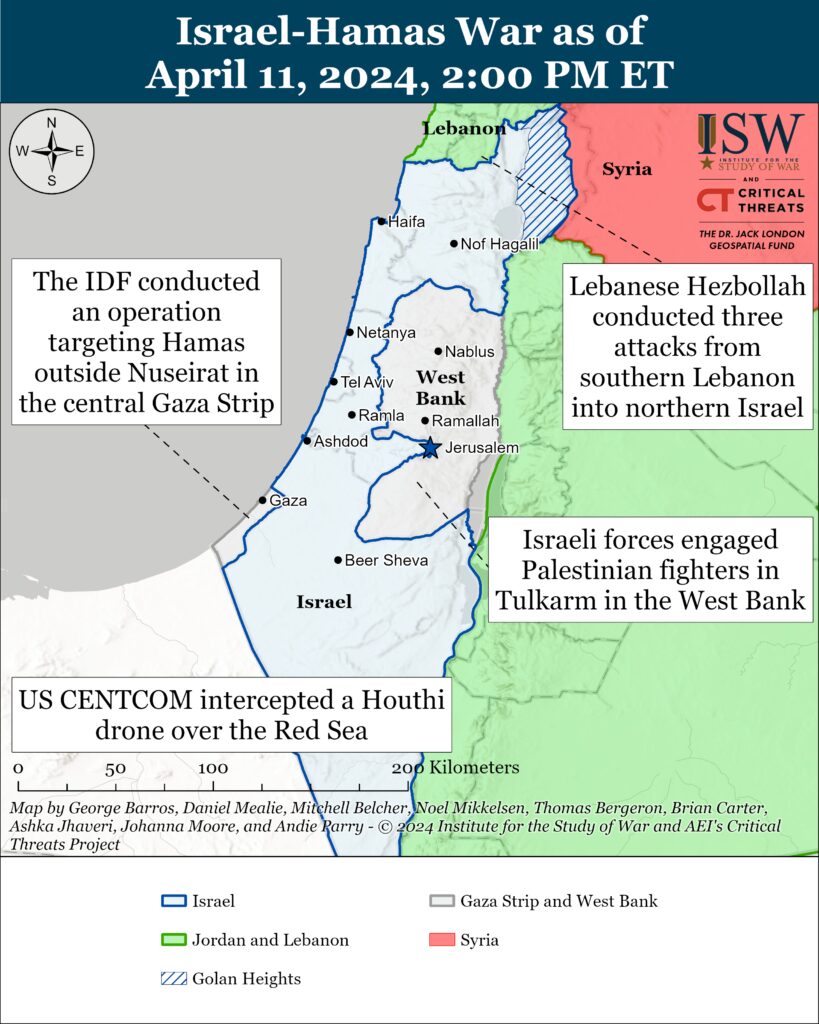
Gaza Strip
Axis of Resistance objectives:
Erode the will of the Israeli political establishment and public to sustain clearing operations in the Gaza Strip
Reestablish Hamas as the governing authority in the Gaza StripThe Israel Defense Forces (IDF) announced on April 11 that it had conducted a raid in Shujaiya in the northern Gaza Strip in recent days.[xii] The IDF Northern Brigade (Gaza Division) has conducted “targeted activities” in the area recently, including killing Palestinian fighters and destroying military infrastructure, such as a Hamas training base
Palestinian militias conducted several attacks targeting Israeli forces in the northern Gaza Strip on April 11. The al Aqsa Martyrs’ Brigades, which is the self-proclaimed military wing of Fatah, mortared Israeli vehicles south of Gaza City.[xiii] Palestinian Islamic Jihad (PIJ) separately said that it conducted a sniper attack targeting an Israeli soldier in al Taqa, east of Gaza City.[xiv]
The IDF announced on April 11 that it conducted an operation targeting Hamas outside Nuseirat in the central Gaza Strip. The IDF Nahal Brigade and 401st Brigade led the operation around Nuseirat.[xv] The IDF Air Force coordinated with the 215th Artillery Brigade (162nd Division) and directed airstrikes targeting dozens of Palestinian fighters and military infrastructure before Israeli ground forces entered the area.[xvi] The Nahal Brigade identified a fighter emerging from a tunnel, and the IDF Air Force conducted an airstrike targeting the fighter as they approached Israeli forces.[xvii] The IDF Navy separately conducted several strikes targeting Palestinian fighters along the central Gaza Strip coast.[xviii]
The Palestinian Mujahideen Movement and Popular Front for the Liberation of Palestine–General Command (PFLP-GC) conducted a combined mortar attack targeting Israeli forces north of Nuseirat refugee camp on April 11.[xix] PFLP-GC is a Palestinian faction based primarily in Syria.[xx] The faction receives support from Iran and has cooperated with other elements of the Axis of Resistance.[xxi] This event marks the second known instance of the PFLP-GC attacking the IDF in the Gaza Strip since the Israel-Hamas war began.[xxii]
The IDF and Shin Bet killed a Hamas fighter who was responsible for financing Hamas military activities in Rafah, on April 11.[xxiii] The IDF said that the fighter transferred hundreds of thousands of dollars to Hamas in December 2023 for its operations in Rafah.[xxiv]
Israeli media reported on April 11 that an IDF Southern Command colonel approved the airstrike that killed three sons of Hamas Political Bureau Chairman Ismail Haniyeh in the northern Gaza Strip on April 10.[xxv] Israeli media reported that senior Israeli officials, including Israeli Prime Minister Benjamin Netanyahu, Israeli Defense Minister Yoav Gallant, and IDF Chief of Staff Herzi Halevi, were not aware of the strike before it occurred.[xxvi] Israeli media reported that the IDF targeted Haniyeh’s sons over their involvement in holding Israeli hostages.[xxvii] The reports are consistent with the IDF reporting on April 10 that Haniyeh’s sons were Hamas fighters.[xxviii] Unspecified Israeli officials told Israeli media that IDF leaders believed that Israel is not close to a ceasefire deal with Hamas and that the strike would not affect hostage negotiations.[xxix]
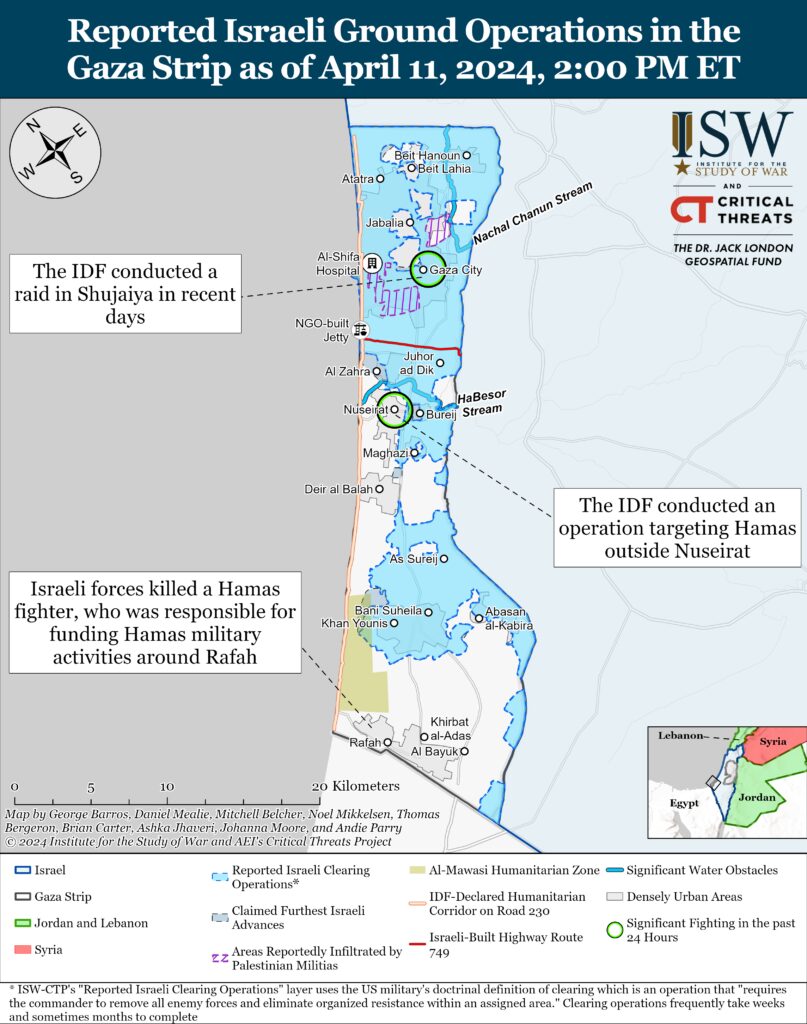
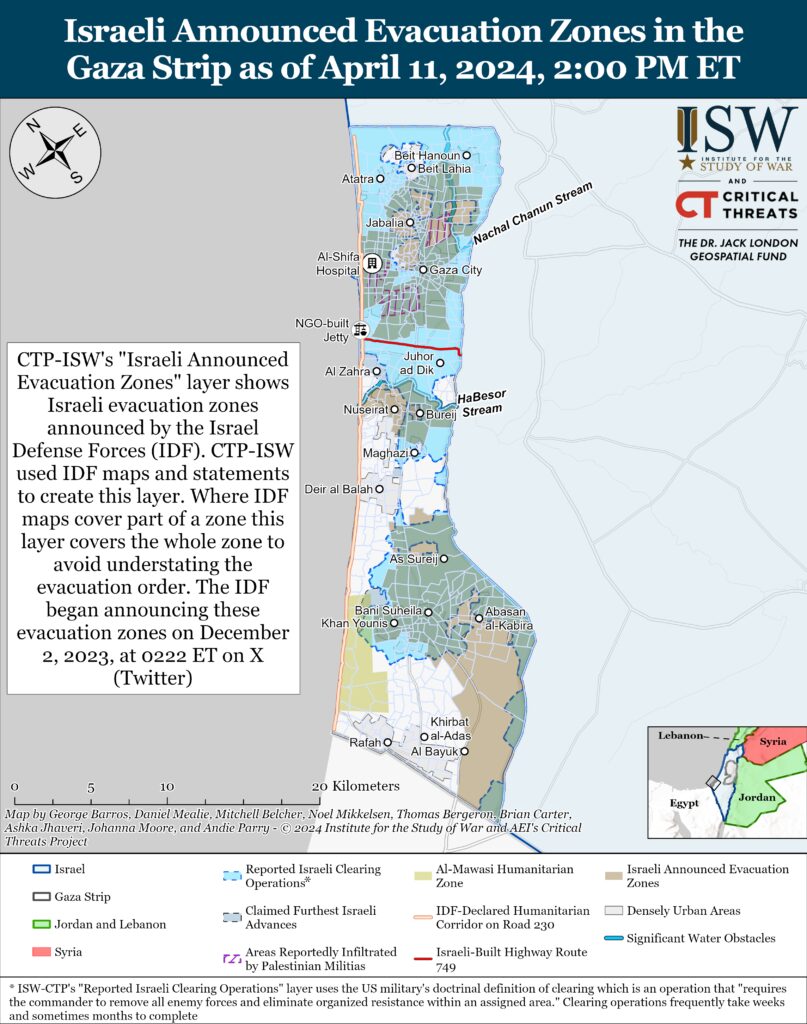
The IDF said on April 11 that Israel is increasing the delivery of aid into the Gaza Strip, particularly to the northern part.[xxx] Israeli Defense Minister Gallant said that these efforts are part of the next Israeli phase of humanitarian efforts and include opening new crossings into the Gaza Strip, boosting aid deliveries from Jordan, establishing a joint command to coordinate military operations and aid efforts, and other projects, such as the establishment of a temporary floating pier.[xxxi] IDF spokesperson Rear Adm. Daniel Hagari said that Israel approved the construction of another border crossing into the northern Gaza Strip and the opening of the Port of Ashdod to enable more aid flow.[xxxii] Hagari’s comments are consistent with an Israeli Army Radio report on April 10 that Israel would construct a new crossing instead of opening the Erez crossing.[xxxiii] Hagari also said that the IDF is establishing field hospitals and other kinds of infrastructure as well as providing food, water, and shelter in the central Gaza Stirp.[xxxiv] The IDF said on March 13 that it plans to move civilians from Rafah to “humanitarian enclaves” in the central Gaza Strip before any Israeli clearing operation into Rafah.[xxxv] Israel expects the number of trucks entering the Gaza Strip to increase gradually from 350 to 500 per day.[xxxvi] The UN Security Council said in a statement on April 11 that it acknowledged the Israeli efforts to facilitate more aid into the Gaza Strip “but stressed that more should be done to bring the required relief given the scale of needs in Gaza.”[xxxvii]
Israeli military officials met with several international aid organizations on April 10 to discuss the humanitarian situation in the Gaza Strip.[xxxviii] The IDF Southern Command Commander Maj. Gen. Yaron Finkelman and Coordinator of Government Activities in the Territories (COGAT)—a department within the Israeli Defense Ministry—Maj. Gen. Ghassan Alyan met with representatives from UN agencies, the Red Cross, and USAID, among others.[xxxix] Israeli officials presented their upcoming plans for increasing the pace of aid transfers into the strip. Israeli Army Radio noted that the meeting followed the Israeli strike that killed seven World Central Kitchen (WCK) aid workers on April 1.[xl] Some aid organizations have suspended operations in the Gaza Strip following the WCK attack, citing concerns of a lack of protection for civilians.[xli] The IDF spokesperson said on April 11 that the IDF is implementing lessons learned from WCK attack.[xlii]
Unspecified Palestinian fighters conducted an indirect fire attack from the central Gaza Strip into Israel on April 11.[xliii] Israeli Army Radio reported that four munitions fell short inside the Gaza Strip. No Palestinian militia has claimed responsibility for the attack at the time of this writing.
West Bank
Axis of Resistance objectives:
Establish the West Bank as a viable front against IsraelIsraeli forces engaged Palestinian fighters in Tulkarm in the West Bank on April 11.[xliv] The IDF reported on April 11 that Israeli forces arrested six wanted individuals across the West Bank.[xlv] The IDF seized small arms during these operations. Israeli forces separately arrested an individual in Hebron on suspicion of them planning to conduct a stabbing attack.[xlvi]
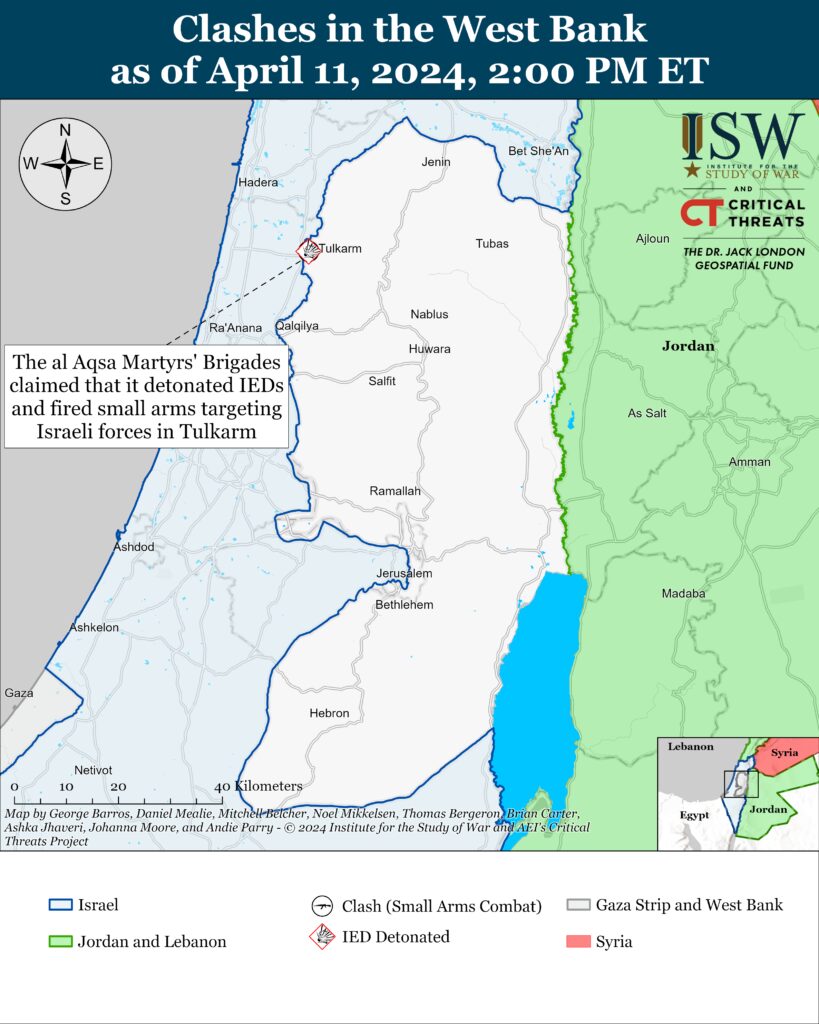
This map is not an exhaustive depiction of clashes and demonstrations in the West Bank.
Southern Lebanon and Golan Heights
Axis of Resistance objectives:
Deter Israel from conducting a ground operation into Lebanon
Prepare for an expanded and protracted conflict with Israel in the near term
Expel the United States from SyriaLebanese Hezbollah has conducted at least three attacks from southern Lebanon into northern Israel since CTP-ISW’s last data cutoff on April 10.[xlvii]
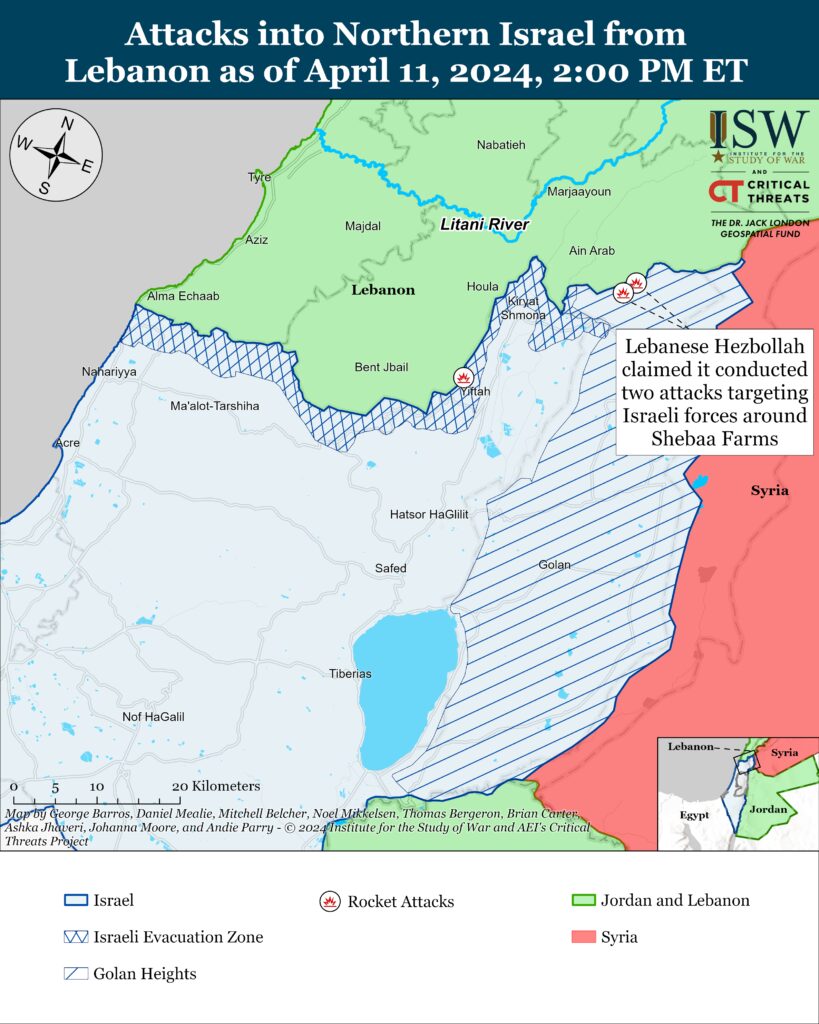
Recorded reports of attacks; CTP-ISW cannot independently verify impact.
Iran and Axis of Resistance
Iraqi Prime Minister Mohammad Shia al Sudani wrote an article for Foreign Affairs on April 11 reiterating his intention to end the US-led international coalition’s presence in Iraq and transition to a “comprehensive” bilateral relationship with the United States.[xlviii] Sudani likely published the article as part of his preparations for his official visit to Washington, DC, on April 15. Sudani said that US and Iraqi military officials agreed to end the US-led international coalition’s presence in Iraq “in a gradual and orderly manner on an agreed timeline,” although he did not provide details on this timeline.[xlix] Sudani argued that the US-Iraqi relationship should extend beyond military and security cooperation to include economic, energy, and technological cooperation.[l] US and Iraqi officials began talks about the status of the US-led international coalition in late January 2024.[li] The latest round of talks occurred on April 8 under the chairmanship of US CENTCOM Commander Gen. Michael Erik Kurilla and Iraqi Armed Forces General Staff Chief Gen. Abdel Emir Rashid Yarallah.[lii]
US CENTCOM confirmed that it intercepted three Houthi drones over the Gulf of Aden and Red Sea on April 10. The Houthis claimed on April 10 that they conducted several attacks targeting commercial and military vessels in the Gulf of Aden.[liii]
US CENTCOM preemptively struck eight Houthi drones in Houthi-controlled Yemen on April 10.[liv] CENTCOM assessed that the drones presented an imminent danger to commercial and military vessels in the region. Houthi-affiliated media separately claimed that the United States conducted airstrikes near Hudaydah on April 10.[lv]
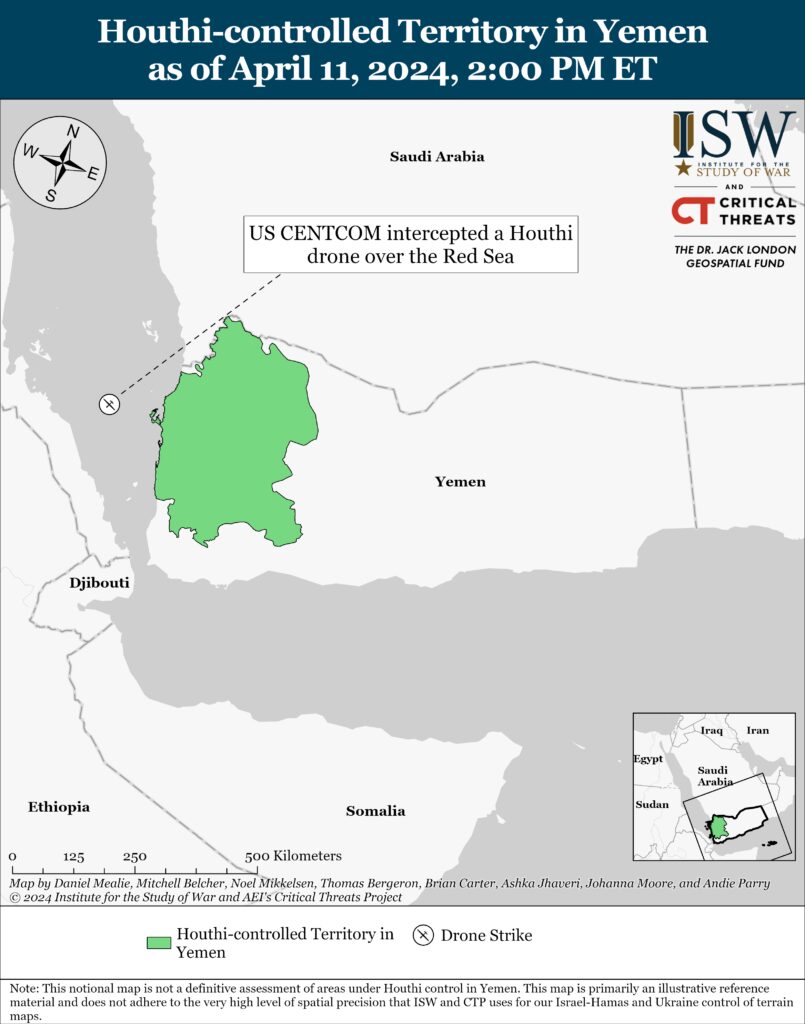
US Central Command (CENTCOM) Commander Gen. Michael Erik Kurilla traveled to Israel on April 11 to coordinate preparations for a possible Iranian and/or Iranian-backed attack into Israel. Kurilla met with senior Israeli military officials, including IDF spokesperson Daniel Hagari.[lvi] Iranian officials have repeatedly threatened that they will retaliate for Israel killing several senior IRGC officers in Damascus on April 1.[lvii]
 Eurasia Press & News
Eurasia Press & News
